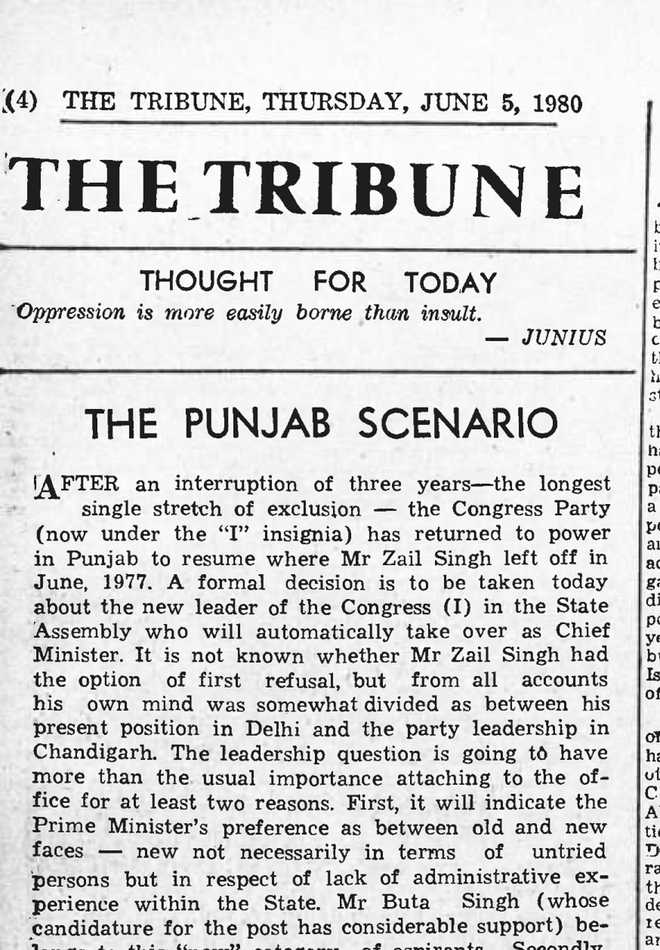The Punjab Scenario
After an interruption of three years — the longest single stretch of exclusion – the Congress Party (now under the “I” insignia) has returned to power in Punjab to resume where Mr Zail Singh left off in June, 1977. A formal decision is to be taken today about the new leader of the Congress (I) in the State Assembly who will automatically take over as Chief Minister.
It is not known whether Mr Zail Singh had the option of first refusal, but from all accounts his own mind was somewhat divided as between his present position in Delhi and the party leadership in Chandigarh. The leadership question is going to have more than the usual importance attaching to the office for at least two reasons. First, it will indicate the Prime Minister’s preference as between old and new faces – new not necessarily in terms of untried persons but in respect of lack of administrative experience within the State.
Mr Buta Singh (Whose candidature for the post has considerable support) belongs to this “new” category of aspirants. Secondly, the choice of Chief Minister may show whether Mrs Indira Gandhi feels the need for a tough leader in anticipation of trouble at the hands of the Akalis, in which case her nominee could be a different person.
Going by the total strength of the Opposition – 54, including 37 Akalis, in a House of 117 — the Congress (I) Government in the State will not find the task of governance easy. Although the Akalis could have done better at the polls, they have by no means done badly.
Their ranks include several experienced legislators and tried administrators. Furthermore, as past history has shown on several occasions, the Akalis in opposition are somewhat more effective than when they are in power. The reason seems to be that they find it easier to remain united in adversity than when they wield authority.
They will also have the support of five CPM and nine CPI members unless the latter come to have second thoughts about the Congress (I) which, at the moment, is a common enemy. Punjab has been administratively rather more fortunate than most other states. Even under the handicap of political pressures during the three years of the Akali-Janata Government, the civil servants functioned reasonably well. The State’s economy, despite complaints of discrimination by the Centre, remained in good health. The new government will, therefore, inherit a legacy of which its predecessor has no reason to feel ashamed.
Both the Congress (I) and the Akalis have pockets of dissidence among them. Those who feel disgruntled over having been denied party nominations are a common factor, but the Congress (I) will, in addition, have to face the displeasure of those whose exclusion from the new Ministry will cause disappointment and even bitterness. Not being in power, the Akalis will be free from that particular disadvantage, but intra-party bitterness over the experience of some during the election campaign will persist, at least for some time to come.
The poll results show that Mr Parkash Singh Badal has got the better of the party President, Mr Jagdev Singh Talwandi, but the performance of the Akalis on the floor of the State Assembly will depend upon the extent to which factional ill-feeling is subordinated to the common interest. The crucial Hindu vote went against the Akalis in last week’s poll. The fortunes of the party have always been linked with the quantum of support it gets from the minority community. Perhaps the necessary lesson has been learnt on both sides. It should be clear to the two communities that their only hope lies in working together and not at cross purposes.









